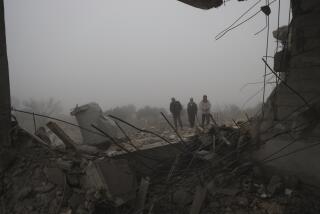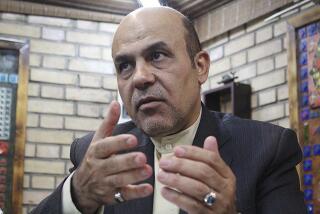Kidnappers in Iraq Kill Egyptian Envoy
- Share via
BAGHDAD — Al Qaeda’s Iraq wing said Thursday that it had carried out “the verdict of God” and executed Egypt’s top envoy to Baghdad, who was kidnapped from a street in the capital five days earlier.
The Egyptian government confirmed the death of the diplomat, Ihab Sherif, saying he had “lost his life at the hands of terrorism which trades in Islam.”
Sherif is the highest-level hostage executed since U.S.-led forces ousted Iraqi President Saddam Hussein in 2003. The slaying was part of an apparent campaign to deter other nations from expanding diplomatic ties with Iraq’s new government.
Egyptian President Hosni Mubarak offered his condolences to Sherif’s family and said the killing “will not deter Egypt from its firm position in support of Iraq and its people,” according to a statement carried on Egypt’s official news service.
A website used by the Al Qaeda offshoot in Iraq announced the killing, showing a video of a blindfolded man who appeared to be Sherif giving his name and address and acknowledging that he once worked as a diplomat in Israel. The website, which earlier had displayed Sherif’s identification cards, did not show the killing.
“We, Al Qaeda in Iraq, announce that the verdict of God against the ambassador of the infidels, the ambassador of Egypt, has been carried out. Thank God,” the website said.
Led by Jordanian-born militant Abu Musab Zarqawi, the organization is believed to be responsible for dozens of deadly suicide bombings and the beheading of hostages, including three Americans.
The website also claimed responsibility for the attempted kidnapping of the top diplomats of Bahrain and Pakistan during separate ambushes Tuesday on the streets of Baghdad. Both escaped, but the Bahraini diplomat, Hassan Ansari, suffered a gunshot wound.
The website said the group was trying “to capture as many ambassadors as we can” in an apparent effort to undermine Iraq’s diplomatic relations with other nations.
Both Iraq and the United States have been urging other countries to expand their diplomatic missions. According to the Iraqi Foreign Ministry, 43 nations have sent diplomats here; 21 countries are represented by ambassadors, the highest level of diplomatic relations.
After Tuesday’s ambushes, Pakistan moved its Iraq envoy to Jordan, but Bahrain’s king said he would promote his envoy to ambassador.
Egypt had been expected to become the first Arab nation to be represented in Baghdad by an ambassador. Sherif, 51, the father of two daughters, arrived in Baghdad as the head of Cairo’s diplomatic mission less than a month before his kidnapping. He was charge d’affaires at the Egyptian Embassy in Tel Aviv from 1999 to 2003.
Foreign diplomats in Baghdad are usually heavily guarded, but Sherif drove alone in his white jeep Saturday evening to a commercial street not far from his house. Witnesses reported that he was abducted there by as many as eight gunmen. His vehicle, parked by a newsstand, was found the next morning by an employee who had gone to pick him up at his home and discovered that he was missing.
The website said it had delayed announcing the abduction for four days as the group attempted to kidnap other diplomats.
In Cairo, Sherif’s 19-year-old daughter, Enji, said the family was surprised by the abduction and killing. “We are Muslims, and he was in an Arab country,” she told reporters as she wept. “He had told me not to be afraid because Iraq is an Arab country.”
The Al Qaeda group said it had declared Sherif an “apostate” and sentenced him to death because of Egypt’s support for the U.S. and Iraq.
“Our sheik Abu Musab Zarqawi ... is determined to stand up to traitors and crusaders and all those who stand with them, and we vow to all the dictatorial nations that Iraq is not safe for infidels because God has empowered the mujahedin,” the website said.
An Iraqi official who asked not to be identified told the Los Angeles Times earlier that Sherif may have been lured to the scene of his abduction with the promise of meeting with representatives of Iraqi insurgents.
Before word of the execution became public, Interior Minister Bayan Jabr expressed dismay that some diplomats had attempted to negotiate with armed opposition groups privately, but he did not name the Egyptian.
“Some of them go to places on their own in order to meet some insurgents,” the minister said. “We warned about doing such things before, as the results could be very serious.”
Jabr announced that within the last 10 days, Iraqi authorities had rolled up a secret cell of turncoat officers with ties to Zarqawi’s Al Qaeda branch within the upper echelons of an elite commando force.
“The intent of this group was to conduct assassinations inside the brigade and an operation to totally blow up the Ministry of Interior headquarters,” he said.
Eight suspected officers, including three with the rank of brigadier general, were among ex-Iraqi army officers recruited last year from Baghdad and northern Babil province, an area called the “triangle of death” because it is a hotbed of the Sunni Arab-led insurgency.
Jabr also announced the arrest of a suspect allegedly in possession of a computer hard drive containing names, addresses and other personal details of 7,000 public officials ranking as high as Prime Minister Ibrahim Jafari, underscoring the extent of infiltration by insurgents within the fledgling government.
The man arrested came under police suspicion after he checked into a Baghdad hotel and began spending “enormous amounts of cash,” Jabr said.
Meanwhile, violence continued across Iraq, including twin car bombings late Wednesday that killed at least 13 people and injured at least 27 near the predominantly Shiite Muslim city of Hillah, south of Baghdad.
Times staff writers Borzou Daragahi in Baghdad and Megan K. Stack in Cairo contributed to this report.
More to Read
Sign up for Essential California
The most important California stories and recommendations in your inbox every morning.
You may occasionally receive promotional content from the Los Angeles Times.













